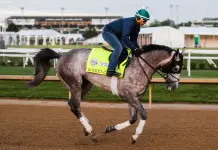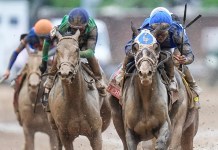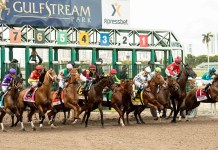New York
A line of dominos accelerated their fall Wednesday on Hall of Fame trainer Bob Baffert, who is teetering on the brink of losing the record-breaking Kentucky Derby victory that Medina Spirit earned for him 32 days earlier.
First came a New York Times report that the unlikely winner failed the second part of the drug test that flagged him last month for having excessive trace amounts of betamethasone in his bloodstream. After Baffert’s attorney, Craig Robertson, admitted the report was true, Churchill Downs acted swiftly in banning him for two years from racing horses at any of its tracks.
The language Churchill Downs CEO Bill Carstanjen used in his statement were not sheepish. “Reckless practices and substance violations that jeopardize the safety of our equine and human athletes or compromise the integrity of our sport are not acceptable,” he said. “As a company we must take measures to demonstrate that they will not be tolerated. Mr. Baffert’s record of testing failures threatens public confidence in Thoroughbred racing and the reputation of the Kentucky Derby. Given these repeated failures over the last year, including the increasingly extraordinary explanations, we firmly believe that asserting our rights to impose these measures is our duty and responsibility.”
Baffert did not respond to a text message asking for a public reaction. In his admission before the Churchill Downs edict, Robertson concluded by saying, “At the end of the day we anticipate this case to be about the treatment of Medina Spirit’s skin rash with Otomax (ointment). We will have nothing further to say until the additional testing is complete.”
Otomax clearly translates to an “increasingly extraordinary explanation” in Carstanjen’s mind. Baffert has contended that drug positives in recent years for Triple Crown winner Justify, Eclipse Award-winning filly Gamine and with Arkansas Derby victor Charlatan were accidental and not intentional. He blamed Justify’s 2018 positive for scopolamine on tainted feed, Gamine’s betamethasone sample on being a legal treatment that was not fully out of her system and Gamine and Charlatan’s lidocaine spikes on assistant trainer Jimmy Barnes’s handling of a pain-relief patch that he inadvertently spread to the horses.
At some point soon the Kentucky Horse Racing Commission is poised to disqualify Medina Spirit from his Derby victory. The New York Racing Association did not wait; it indefinitely barred Baffert from entering any of his horses at Aqueduct, Saratoga and Belmont Park, where he and Medina Spirit will be conspicuous by his absence from Saturday’s Belmont Stakes.
The California Horse Racing Board issued a pre-emptive statement last week saying it would not deal with any discipline of Baffert before everything was done in Kentucky. Racetrack executives at Baffert’s home tracks of Santa Anita and Del Mar have also been mostly quiet, also waiting for the second split sample that came back positive on Medina Spirit.
Robertson has not outlined specific strategy for Baffert’s fightback. The appeals process within the bulwark of racing seems likely, not to mention formal requests asking judges to intervene and block the moves that have been made to keep Baffert, his employees and his horses out of a growing number of racetracks.
Following is Wednesday’s full statement from Churchill Downs:
Churchill Downs Incorporated (“CDI”) announced today the suspension of Bob Baffert for two years effective immediately through the conclusion of the 2023 spring meet at Churchill Downs Racetrack. The suspension prohibits Baffert or any trainer directly or indirectly employed by Bob Baffert Racing Stables from entering horses in races or applying for stall occupancy at all CDI-owned racetracks. This decision follows the confirmation by attorneys representing Bob Baffert of the presence of betamethasone, a prohibited race-day substance, in Medina Spirit’s bloodstream on the day of the 147th running of the Kentucky Derby in violation of the Commonwealth of Kentucky’s equine medication protocols and CDI’s terms and conditions for racing.
“CDI has consistently advocated for strict medication regulations so that we can confidently ensure that horses are fit to race and the races are conducted fairly,” said Bill Carstanjen, CEO of CDI. “Reckless practices and substance violations that jeopardize the safety of our equine and human athletes or compromise the integrity of our sport are not acceptable, and as a company we must take measures to demonstrate that they will not be tolerated. Mr. Baffert’s record of testing failures threatens public confidence in Thoroughbred racing and the reputation of the Kentucky Derby. Given these repeated failures over the last year, including the increasingly extraordinary explanations, we firmly believe that asserting our rights to impose these measures is our duty and responsibility.”
CDI reserves the right to extend Baffert’s suspension if there are additional violations in any racing jurisdiction.
The Kentucky Horse Racing Commission (“KHRC”) has the sole authority to disqualify Medina Spirt as the winner of Kentucky Derby 147. It is the understanding of CDI that the KHRC is pursuing the completion of its investigation of this matter in accordance with its rules and regulations.
This was the entire statement sent earlier Wednesday by Robertson:
In response to the inquiries, this will acknowledge that the Medina Spirit split sample confirmed the finding of betamethasone at 25 picograms. There is other testing that is being conducted, including DNA testing. We expect this additional testing to confirm that the presence of the betamethasone was from the topical ointment, Otomax, and not an injection. At the end of the day we anticipate this case to be about the treatment of Medina Spirit’s skin rash with Otomax. We will have nothing further to say until the additional testing is complete.





